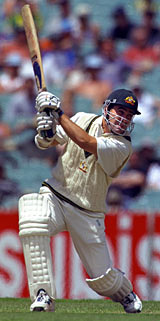Justin Langer
|
|

|
Justin Lee Langer was born in Perth, Western Australia, on November 21, 1970, into a Catholic family whose European origins he has never unearthed. His Uncle Robbie played World Series cricket for Australia, and televised games against Viv Richards were an inspiration. His father, a Perth entrepreneur, laid a wicket in the backyard for his three sons, and hired a professional coach to teach Justin the basics. He was still a child when he decided that he must play for Australia. He was spotted early, and joined a boys' team that visited England in 1987. He scored a hundred on the Nursery Ground at Lord's, received a bat contract, and got the first taste of what he wanted to do for a living. He played Under-19 Test cricket, and attended the Academy in Adelaide. Though he never grew taller than 5ft 8in, he regards his size as an advantage, referring to Don Bradman, Sachin Tendulkar and Brian Lara as role models. The point is that small batsmen tend to be nimble, and Langer was rigorously taught as a boy that a short backlift and fast feet are the keys to batting.
To spectators familiar with his range of violent leg-side shots and his fierce cover driving, and who remember that his 122 against New Zealand came off 122 balls, it will seem bizarre that Langer's problem as a young man was that he could not hit the ball off the square. His coach, Rod Marsh, was forced to remind him that batting was about entertaining as well as accumulation, but he had scored enough runs by cutting and glancing to get into the Western Australian team at 21. He proved himself straight away, scoring 149 in the 1991-92 Sheffield Shield final. Langer says this is still his best innings, perhaps because he finally realised he could hit boundaries through the covers.
Langer pulls and drives so well because he sees the ball early - something he had taught himself to do by concentrating on the exact moment of its release from the bowler's hand. Indeed, he believes there is nothing a batsman cannot teach himself. His dedication and his self-conscious striving for excellence seem rooted in Japan rather than in any Anglo-Saxon culture. He studied martial arts as a youth, which gives him physical confidence. (Sledging has never worried him.)
He first played for Australia when they lost to West Indies at Adelaide in January 1993, though in five years after that was selected only seven more times. He toured England in 1997 without playing a Test, but finally became Australia's regular No. 3 during the next Ashes series in 1998-99, scoring 179 not out at Adelaide and averaging 48.44. However, he fits more comfortably into Steve Waugh's team than Mark Taylor's. Langer admires Waugh extravagantly because he has helped him believe in himself, and he returns Waugh's loyalty with energetic displays of togetherness in the field. There is a childlike quality to his pleasure in being in the Australian team; he says it is like playing backyard cricket with ten brothers.
He began to play county cricket for Middlesex, just as their decline set in, in 1998. No blame for this seems to attach to Langer, who was easily their leading run-maker three years in succession. In 2000, he became captain, and relished living in London with his young family. Conscious of the importance of a life outside cricket, he has worked as a stockbroker and a public relations man in Perth, but what he likes best is writing. His diary of an English summer, From Outback to Outfield, published in 1999, was a first-rate description of a county cricketer's life, and he wants to go on writing when he retires. A cricket writer? "No," he says surprisingly, "I think I might write novels."

